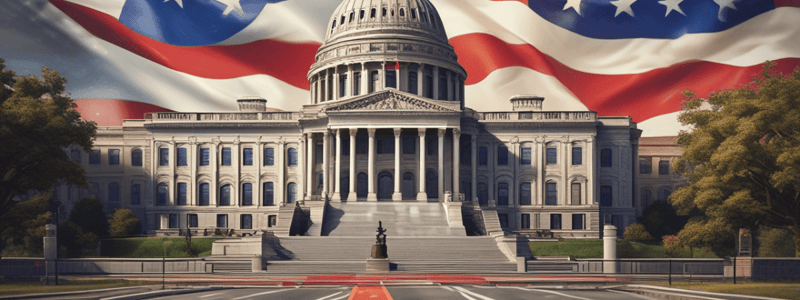Podcast
Questions and Answers
What is the purpose of the Supremacy Clause in the United States Constitution?
What is the purpose of the Supremacy Clause in the United States Constitution?
- To limit the powers of state governments in favor of federal authority
- To ensure that state laws always take precedence over federal laws
- To provide a framework for resolving conflicts between federal and state laws (correct)
- To grant states immunity from federal laws
In cases where federal law and state law are in conflict, which takes precedence according to the Supremacy Clause?
In cases where federal law and state law are in conflict, which takes precedence according to the Supremacy Clause?
- State law
- Local law
- Federal law (correct)
- Tribal law
What might be a subject of disputes among states in the United States according to the text?
What might be a subject of disputes among states in the United States according to the text?
- State motto design
- Language spoken by state officials
- Uniform currency regulations
- Disagreements over trade agreements (correct)
Which factor plays a significant role in shaping the current landscape of intergovernmental relations according to the text?
Which factor plays a significant role in shaping the current landscape of intergovernmental relations according to the text?
What are some of the issues that have sparked intense debates regarding the balance of power between federal and state entities?
What are some of the issues that have sparked intense debates regarding the balance of power between federal and state entities?
Study Notes
Conflicts Over National and State Governments' Roles: Federalism, Supremacy Clause, Interstate Relations, and Constitutional Debates
In understanding conflicts between national and state governments' roles, we must first explore the interplay of federalism, the Supremacy Clause, interstate relations, and constitutional debates. These concepts have shaped and continue to shape the dynamics of governmental relationships within the United States.
Federalism
Federalism is a concept of governance in which power is divided between two levels: national and regional (or local) levels. In the United States, this division of powers can lead to potential conflicts when the interests and responsibilities of each level collide. For instance, states may attempt to assert their rights under the Tenth Amendment, while the federal government may act under its enumerated powers.
Enumerated Powers vs. Reserved Powers
Under our Constitution, certain powers belong solely to the federal government by virtue of having been explicitly granted by Congress, while some matters remain the exclusive domain of the states. This distribution of authority can create tension when perceived encroachments occur on either side of the divide.
Dual Sovereignty
The concept of dual sovereignty refers to both the national and state governments sharing powers simultaneously within their respective jurisdictions. This relationship allows for some level of coexistence between federal and state authorities while maintaining the balance of power in the system.
Role of Courts
Courts play an important part in mediating conflicts arising from overlapping jurisdiction by interpreting the scope of federal and state authority. Decisions made by these bodies can have far-reaching implications on the distribution of power between different levels of government.
Supremacy Clause
The Supremacy Clause is a provision found in Article VI of the United States Constitution that asserts federal law at times supersedes conflicting state laws or constitutions. This clause provides the framework for understanding how conflicts are resolved when there is disagreement over which level should take precedence.
Constitutional Conflicts
When controversies arise regarding statutes enacted by Congress as well as those enacted by state legislatures, courts must determine whether they conflict with other provisions of the U.S. Constitution. The Supremacy Clause ensures that federal law takes priority if such conflicts exist.
Intergovernmental Immunities
Intergovernmental immunities refer to protections afforded to states and local governments from being sued directly under certain circumstances. These immunities can sometimes complicate matters when disputes involve multiple layers of government.
Interstate Relations
Aside from conflicts involving relationships between the federal government and individual states, there may also be disputes among states themselves. These could revolve around trade agreements, economic policies, or issues related to natural resources.
Cooperative Federalism
Cooperative federalism involves collaboration between federal and state governments towards common goals. This approach often helps mitigate potential friction points between entities.
Compacts & Agreements
Various bilateral compacts and agreements serve as conduits through which states work together on shared interests. While not infallible, these arrangements contribute significantly toward managing relationships among various jurisdictions.
Constitutional Debates
Debates surrounding the roles of national and state governments continue to evolve with time. Issues such as fiscal control, environmental protection, education, and healthcare have sparked intense debates regarding the appropriate balance of power between federal and state entities.
Amendments & Reinterpretations
Historically, amendments to the U.S. Constitution have been used to clarify or adjust the balance of powers among various levels of government. Additionally, reinterpretations of existing provisions by the judiciary have also played a crucial role in shaping the current landscape of intergovernmental relations.
In conclusion, conflicts over national and state governments' roles are multifaceted issues that require a nuanced understanding of federalism, the Supremacy Clause, interstate relations, and constitutional debates. As the United States continues to navigate these complexities, it is essential to remain vigilant about potential power imbalances and work towards maintaining a harmonious relationship between different levels of government.
Studying That Suits You
Use AI to generate personalized quizzes and flashcards to suit your learning preferences.
Description
Explore the complexities of conflicts between national and state governments in the United States through the lenses of federalism, the Supremacy Clause, interstate relations, and constitutional debates. Gain insights into how these concepts shape governmental relationships and the balance of powers.




